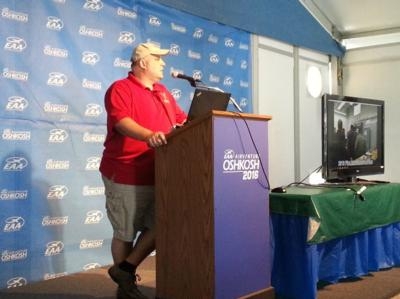Thu, Jul 28, 2016
Presents Update On Milestones Reached At AirVenture
By Anthony Liberatore
Since their first news conference at AirVenture last year, Engineered Propulsion Systems (EPS) has reached several significant milestones on their path towards certification of their Diesel engine.

EPS Co-founder, CEO, and President Michael Fuchs said in a news conference Tuesday that the company has made progress towards both Type (TC) and Production Certification (PC) as well as serial production. Fuchs noted the target date for obtaining a Type Certificate is late 2017, with the PC shortly their after. The EPS Engine is a “Flat Vee” (15º) V8 Heavy Fuel Engine in the 300 to 420 hp class, with fuel consumption specifics that are 30% lower than their Piston competitors and 50% lower than their Turboprop competitors.
Among the milestones noted by Fuchs for 2016 are that the conformity process has proceeded to the point that all engine parts and systems are confirmed. He also noted they have completed their second Propeller Survey with Hartzell Propeller at their Ohio facility. Fuchs also noted that EPS Diesel with be certified for both Composite and Metal Propellers. Early on in EPS's development cycle, EPS met with potential customers from diverse backgrounds such as Missionary Aircraft and Seaplanes to understand what type of propellers were needed for their applications.
Fuchs said the company has ramped up personnel to assist in their efforts towards obtaining their TC and PC, including direct hires, sub-contractors, and those affiliated with their Diesel Injection / ECU system sub-supplier Bosch. At this time, 100 people are working towards both certifications, with the majority of the employees working under the Bosch umbrella.
Fuchs discussed a number of interesting facts about the engine. One is that while it is a 15º V8, the footprint of the engine is that of a traditional flat six cylinder aircraft engine. Another is while it is Liquid Cooled Diesel, there are not aviation fluids available for both systems. However, the engine will utilize the conventional 50/50 coolant and water mix for the liquid cooling system and a heavy duty Diesel truck oil for its lubrication. Fuchs was asked about testing the engine's ECU against potential lightning strikes, and he said the company is working towards meeting DO-160G, FAR 23, and FAR 27 requirements for the ECU.
(Staff image)
More News
Aero Linx: International Federation of Airworthiness (IFA) We aim to be the most internationally respected independent authority on the subject of Airworthiness. IFA uniquely combi>[...]
Ultrahigh Frequency (UHF) The frequency band between 300 and 3,000 MHz. The bank of radio frequencies used for military air/ground voice communications. In some instances this may >[...]
A Few Questions AND Answers To Help You Get MORE Out of ANN! 1) I forgot my password. How do I find it? 1) Easy... click here and give us your e-mail address--we'll send it to you >[...]
From 2019 (YouTube Edition): Learning To Paint Without Getting Any On Your Hands PPG's Aerospace Coatings Academy is a tool designed to teach everything one needs to know about all>[...]
Also: Sustainable Aircraft Test Put Aside, More Falcon 9 Ops, Wyoming ANG Rescue, Oreo Cookie Into Orbit Joby Aviation has reason to celebrate, recently completing its first full t>[...]
 ANN's Daily Aero-Linx (05.06.25)
ANN's Daily Aero-Linx (05.06.25) ANN's Daily Aero-Term (05.06.25): Ultrahigh Frequency (UHF)
ANN's Daily Aero-Term (05.06.25): Ultrahigh Frequency (UHF) ANN FAQ: Q&A 101
ANN FAQ: Q&A 101 Classic Aero-TV: Virtual Reality Painting--PPG Leverages Technology for Training
Classic Aero-TV: Virtual Reality Painting--PPG Leverages Technology for Training Airborne 05.02.25: Joby Crewed Milestone, Diamond Club, Canadian Pilot Insurance
Airborne 05.02.25: Joby Crewed Milestone, Diamond Club, Canadian Pilot Insurance



